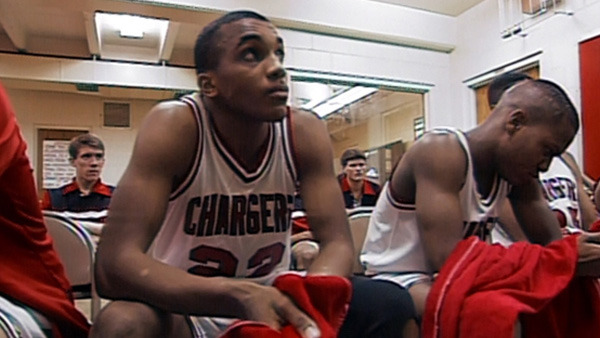Although it’s not on par with the Christopher Nolan “In” coincidence, it’s still interesting that I’m reviewing back-to-back basketball classics starting with “Ho”.
Back-to-back ones I’d been wanting to watch for the longest time to boot, and this one even more than Hoosiers. I would have certainly paid for it, but luckily it’s on HBO Max.
I still remember when I watched the Siskel & Ebert review of Hoop Dreams in 1994. I watched every episode of the show, and had no idea this one would have anything special. But the two critics gushed about Hoop Dreams in a way I hadn’t seem then gush about any other movie. Admittedly I’d been watching the show for less than a year, but I continued to watch it the rest of Siskel’s life, during Ebert’s tenure with guest hosts, during Ebert’s time cohosting with Roeper, during Roeper’s time with guest hosts, and the 2011 PBS revival with two new critics. I don’t think I ever saw another movie as praised.
It was no surprise that, at the end of 1994, Siskel & Ebert did the rare thing of agree on best movie of the year and that it was Hoop Dreams. Later Ebert also proclaimed it the movie of the decade (Siskel was sadly no longer around to choose one). Their outrage that the film was not nominated for Best Documentary was far from unique. In fact, watch this clip of David Letterman hosting the Oscars that year, starting at the 3:00 mark.
It actually led to an overhaul of the documentary-nominating process at the Oscars, and I don’t think movies like Bowling For Columbine, An Inconvenient Truth, or The Hunting Ground would have later won Best Documentary (or even been nominated) otherwise.
Now finally watching Hoop Dreams, I can understand why it was such a big deal. From my limited exposure to documentaries prior to 1994, I feel like most were just a narrator describing things while different talking heads turned up on the screen. Hoop Dreams was revolutionary in its use of home movie footage spanning years, its archival footage from different sources, and its fast pace that makes three hours fly by. Without a hint of exaggeration, its shattering of all conventions makes Hoop Dreams the Citizen Kane of documentaries.
The subject matter is almost as groundbreaking as the techniques. Just three years after Boyz N The Hood, Hollywood was by and large not familiar with the struggles of inner-city youth. We see here two boys from equally struggling families both seeking to turn their fortunes around by attending the elite prep school Isiah Thomas attended, en route to (HOPEFULLY) their own NBA careers.
The movie’s not just special because it’s revolutionary though. The stories are astonishing. As much as we hear about poor black kids escaping the ghetto by playing sports exceptionally, it’s obviously easier said than done. Players could face injuries, bureaucratic difficulties, unexpected life events, or just not being good enough. We also see attempts by one player’s mother to try and move up the ladder a traditional way – finishing her certification to become a licensed vocational nurse.
Obviously such things won’t lead to the life of luxury becoming a sports star allows, and we’re completely riveted to find out whether these teens, William Gates and Arthur Agee, would achieve their “Hoop Dreams”. Whether or not they succeed the journey is nothing short of incredible to watch.
Bottom Line: Majestic.
Up Next: Similar themes.
Questions? Comments? Feel free to write below.
%

Recent Comments